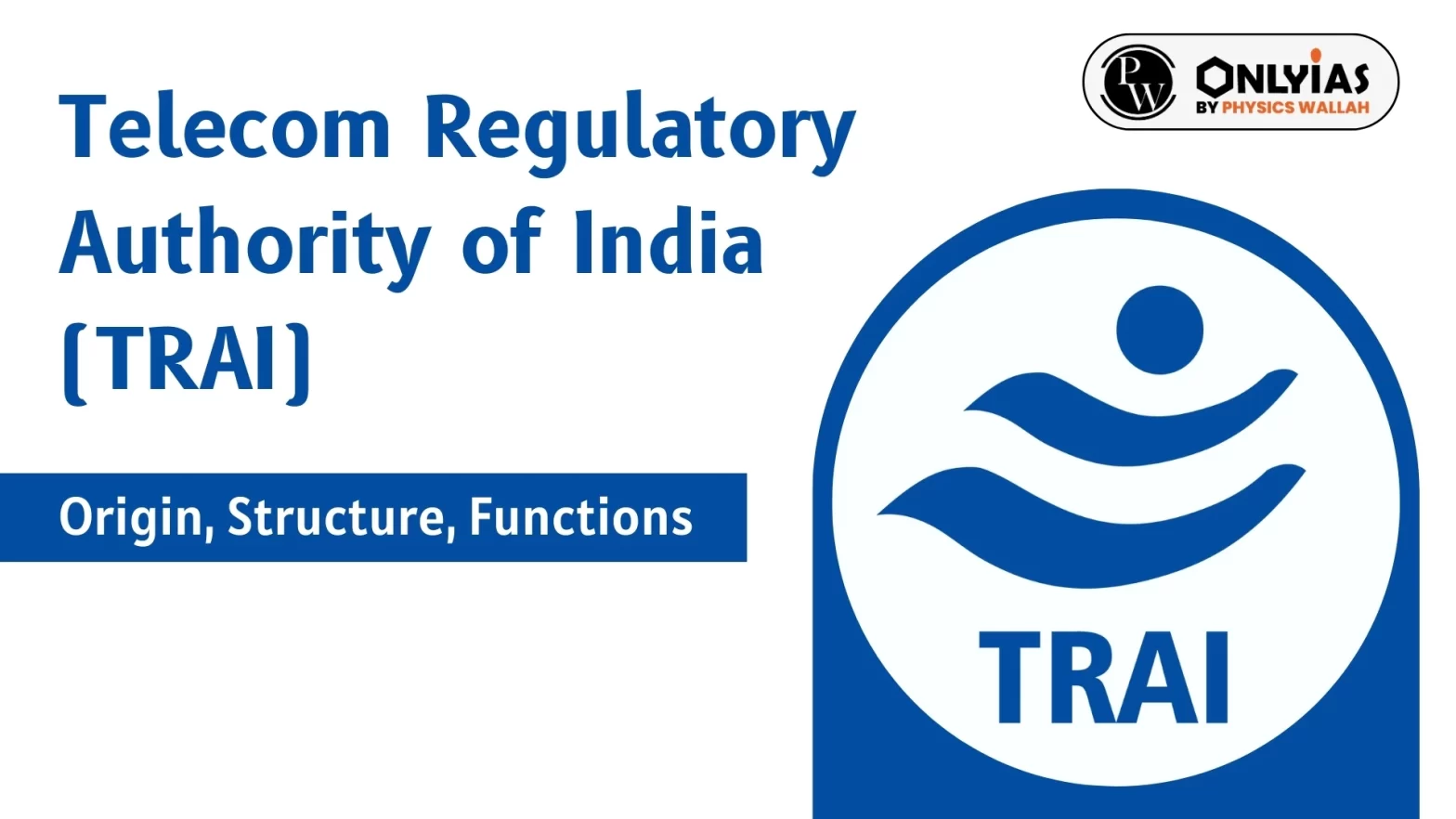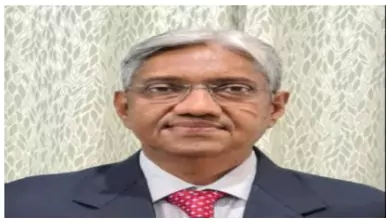Learn about the Telecom Regulatory Authority of India (TRAI), TRAI full form, functions, powers, headquarters, chairmen list, history, and key provisions under the TRAI Act, 1997.

Telecom Regulatory Authority of India (TRAI) is an independent regulatory body set up by the Government of India. It regulates the telecommunications sector in India and its primary responsibilities are regulating service quality, ensuring fair pricing, resolving consumer complaints, and advising the government on policy matters.
For UPSC aspirants, TRAI is an important topic as it appears in the General Studies Paper II, particularly in the section on governance and regulatory institutions. It also appears in GS Paper III and questions about TRAI’s structure, its powers, recent policy reforms, or its role in India’s digital development can be asked.
TRAI is a statutory and regulatory body in India set up by the Government of India under section 3 of the Telecom Regulatory Authority of India Act 1997 to regulate the telecommunications sector in the country.Here is an overview of Telecom Regulatory Authority of India:
| Telecom Regulatory Authority of India (TRAI) Overview | |
| Parameter | Details |
| Full Form | Telecom Regulatory Authority of India |
| Established On | 20 February 1997 |
| Established Under | TRAI Act, 1997 |
| Governing Ministry | Ministry of Communications |
| Type | Independent Statutory Body |
| Current Chairman (2025) | Anil Kumar Lahoti |
| Headquarters | Mahanagar Doorsanchar Bhawan, New Delhi |
| Appellate Body | Telecom Disputes Settlement and Appellate Tribunal (TDSAT) |
The full form of TRAI is the Telecom Regulatory Authority of India. It was established under the TRAI Act of 1997 to serve as the primary regulator for telecom services in the country. It also advises the government on important issues like licensing, spectrum allocation, and the use of technologies. This has also led to the regulation of broadcasting services and DTH television platforms.
TRAI headquarters is situated at Mahanagar Doorsanchar Bhawan, Jawahar Lal Nehru Marg, Old Minto Road, New Delhi – 110002. The headquarters houses TRAI’s administrative wings such as Telecom Services Division, Broadcasting and Cable Services Division, Quality of Service Division, Legal Division, and Consumer Affairs Bureau.
The introduction of Telecom Regulatory Authority of India (TRAI) brought an evolution of India’s telecom services. During the early 1990s, as the Indian economy began to liberalize, the telecom sector was opened up to private participation. It not only encouraged competition and investment, but also brought challenges like pricing disputes, regulatory gaps, and lack of clarity in service standards.
To fix pricing disputes, confusing rules, and rising consumer complaints, the government passed the TRAI Act in 1997, a major step to make the sector fairer and more transparent. TRAI was formally established on 20 February 1997 with the goal of balancing the interests of telecom operators, the government, and consumers in an increasingly dynamic market.
The TRAI Act, 1997, is the legislation that provides TRAI with its legal authority and structural independence. It outlines the powers, functions, and responsibilities of the authority and gives it a central role in telecom policy regulation.
Key Provisions of the TRAI Act:
In 2000, an amendment to the TRAI Act brought an important change. It separated the regulatory and adjudicatory powers of TRAI. As a result, the Telecom Disputes Settlement and Appellate Tribunal (TDSAT) was created to deal with disputes involving consumers, service providers, and the government.
The Telecom Regulatory Authority of India (TRAI) is led by a team consisting of a Chairperson, two part-time members, and two full-time members. These officials are appointed by the Central Government and come from diverse backgrounds such as law, consumer rights, finance, telecommunications, and public administration. This mix of experience brings different perspectives to policymaking and regulation.
The Current TRAI Chairmen is Anil Kumar Lahoti Shri Anil Kumar Lahoti, He is an officer of the Indian Railway Service of Engineers from the 1984 batch and He assumed his office in 2024. He had superannuated as Chairman & CEO, Railway Board on 31st August 2023 after a career spanning about 37 years Indian Railway.

Here’s a TRAI Chairmen List and their tenure:
| TRAI Chairmen | |
| Chairman | Tenure |
| Justice S.S. Sodhi | 1997 to 2000 |
| Pradip Baijal | 2003 to 2006 |
| Nripendra Misra | 2006 to 2009 |
| J.S. Sarma | 2009 to 2012 |
| Rahul Khullar | 2012 to 2015 |
| R.S. Sharma | 2015 to 2020 |
| P.D. Vaghela | 2020 to 2023 |
| Anil Kumar Lahoti | 2024 to Present |
The TRAI Act holds real authority to keep things fair and future-ready. Here are some powers of TRAI:
TRAI’s functions span across policymaking, consumer protection, tariff regulation, and promotion of innovation. Its ensures that the telecom ecosystem remains affordable, transparent, and globally competitive.
Here are the key functions of TRAI:
TRAI is one of the few government bodies that actually asks for public input before major decisions through open papers and consultations.
While TRAI has made significant progress, it hasn’t been without controversy. Several concerns have been raised by civil society, industry stakeholders, and policy experts. Common criticisms include:
These issues highlight the need for structural reforms to strengthen TRAI’s independence and responsiveness.
The Telecom Disputes Settlement and Appellate Tribunal (TDSAT) was formed in 2000 as an independent body to handle disputes in the telecom sector. It acts as a quasi-judicial forum and provides a neutral ground for resolving complex legal and technical issues.
Over the years, TDSAT has stepped in to resolve several major telecom battles from spectrum pricing clashes to service obligation disputes, helping bring legal clarity to the sector.
Ready to boost your UPSC 2026 preparation? Join PW’s UPSC online courses today!
The Telecom Regulatory Authority of India (TRAI) is a statutory body that oversees and regulates telecom and broadcasting services throughout the country.
The full form of TRAI is Telecom Regulatory Authority of India.
Presently, Anil Kumar Lahoti is the Chairman of TRAI.
TRAI plays a key role in managing India’s telecom sector by keeping services fair and competitive, looking out for consumer rights, setting quality benchmarks, and guiding the government on telecom and broadcasting policies
TRAI was established on 20th February 1997 under the Telecom Regulatory Authority of India Act, 1997.
<div class="new-fform">
</div>